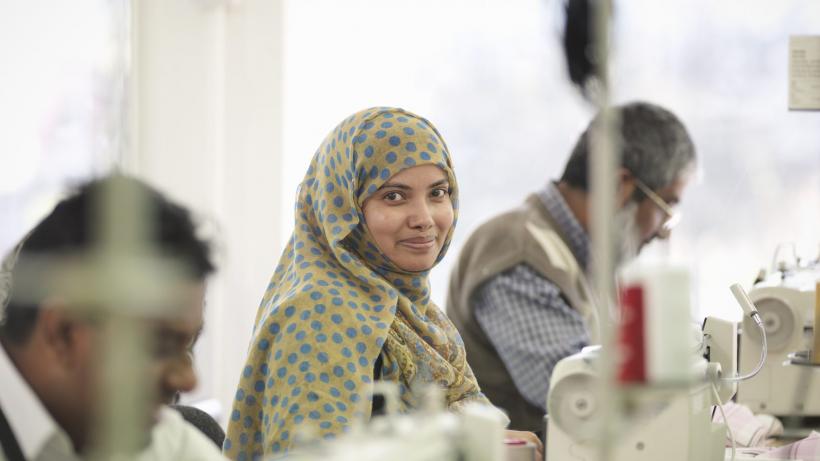
Increasing women’s participation in the workforce
Increasing the number of working women can offer significant social and economic benefits globally, but political and social norms, as well as actual laws, keep women out of the workforce in many developing countries. Our research indicates that access to education, finance, and transportation can help increase their independence and participation in the labour force. Additionally, female managers could improve firm productivity.
What are the challenges?
Cultural and social norms prevent women from realising their full economic potential, and safety concerns restrict their physical and economic mobility. Additionally, gender inequities and the lack of enabling conditions in the workplace make it more difficult for women to actively participate in the labour market.
Addressing the problem
IGC research has found access to soft skills training and finance can encourage girls and women to feel more independent and pursue employment and business opportunities. Additionally, means of transportation that reduce mobility barriers can empower girls and women to continue their education and participate in the labour force. Our evidence also suggests that removing key challenges that prevent women from being promoted to managerial positions could improve productivity in garment firms.
Research results
- Increasing women’s mobility encourages them to continue their education and participate in the labour force. Three IGC studies have rigorously assessed the Government of Bihar’s bicycle programme, which provides girls in grade 9 with money to buy bicycles. Studies found the programme reduced the gender gap in age-appropriate secondary school enrolment by 40% and it led to a 32% increase in enrolment of girls in secondary school, and school dropouts for girls falling below 5%. Another study found the programme seems to change both the girls’ own aspirations and those of their families. Additionally, IGC research in Pakistan on the challenges faced by women while using public transport found that although existing female-only services (in Lahore, three Pink Bus routes) benefit their users substantially, they serve few women due to their very limited geographic coverage, restricted timings, and lack of publicity.
- Soft skills can improve girls’ and women’s educational and health outcomes. An IGC study in Zambia suggests that programmes teaching communication and negotiation skills to girls are perceived positively by participants and may increase their sense of control over their lives and access to resources. Girls in the negotiation treatment reported less hunger, more control over their futures, and more positive conversations with people in their lives.
- Access to microfinance increases female participation in the labour market in the long run. An IGC project in India found that greater access to microfinance loans led to a significant increase in female labour force participation – with the effect driven by self-employment and not by salaried jobs. However, while participating women were more likely to have the last word regarding household spending, it was not associated with an increase in their empowerment. Results also suggest that as a consequence of increasing participation in the labour force, greater access to microfinance reduces fertility in the long run.
- Female managers could improve productivity in garment firms. IGC researchers provided training to female employees in Bangladeshi garment factories and found female trainees to be as or more effective than the male trainees. Despite this finding, the promotion rate for the female trainees (55%) is significantly lower than that for male trainees (85%). There is also some indication that female managers reduce worker absenteeism and increase efficiency slightly, while male managers have relatively lower rates of quality defects.
Impact on policy
The findings of the IGC studies on the Bihar bicycle programme have been cited by the Bihar Ministry of Education and the Ministry of Social and Family Welfare as evidence of the programme’s success.
Following the girls’ negotiation study, resources developed to support the negotiation training were incorporated into the school curriculum by the Zambian Ministry of General Education. The researchers have also made the curriculum freely available for download to support its integration into other relevant programmes. The long-term tracking of girls who participated in the programme will provide further evidence to guide thinking around effective policies to support girls’ empowerment.
The IGC research on gender empowerment and productivity in the garment sector has led to the funding of a project to support the promotion of women, and two garment companies have voluntarily incorporated the training programme as part of their standard management practice.
- Cycling to school: Increasing high school enrolment for girls in Bihar
Nitish Prakash, Karthik Muralidharan - Women’s empowerment and changing social norms: Persistent effects of a one-time targeted in-kind transfer in India
Shabana Mitra, Karl Ove Moene - Public transport and urban labour market integration: A randomised control trial
Erica Field, Kate Vyborny - Negotiating a better future: The impact of teaching negotiation skills on girls’ health and educational outcomes
Nava Ashraf, Kathleen McGinn - Gender empowerment and productivity in the garment sector
Christopher Woodruff, Rocco Macchiavello, Andreas Menzel, Farria Naeem - Access to credit and female labour supply in India
Erica Field, Rohini Pande - Blog: Female empowerment in the Bangladeshi garment industry
Filippo Sebastio - Blog: Vocational training programs in India are leaving women behind, but this needn’t be the case
Charity Troyer Moore, Rohini Pande, Soledad Artiz Prillaman - Blog: Overcoming barriers to women’s mobility in Pakistan
Fizzah Sajjad, Katherine Vyborny, Ghulam Abbas Anjum, Erica Field - Video: Moving up a gear
Karthik Muralidharan, Nishith Prakash - VoxDev video: What happens when you teach teenage girls negotiation skills?
Corrine Low

